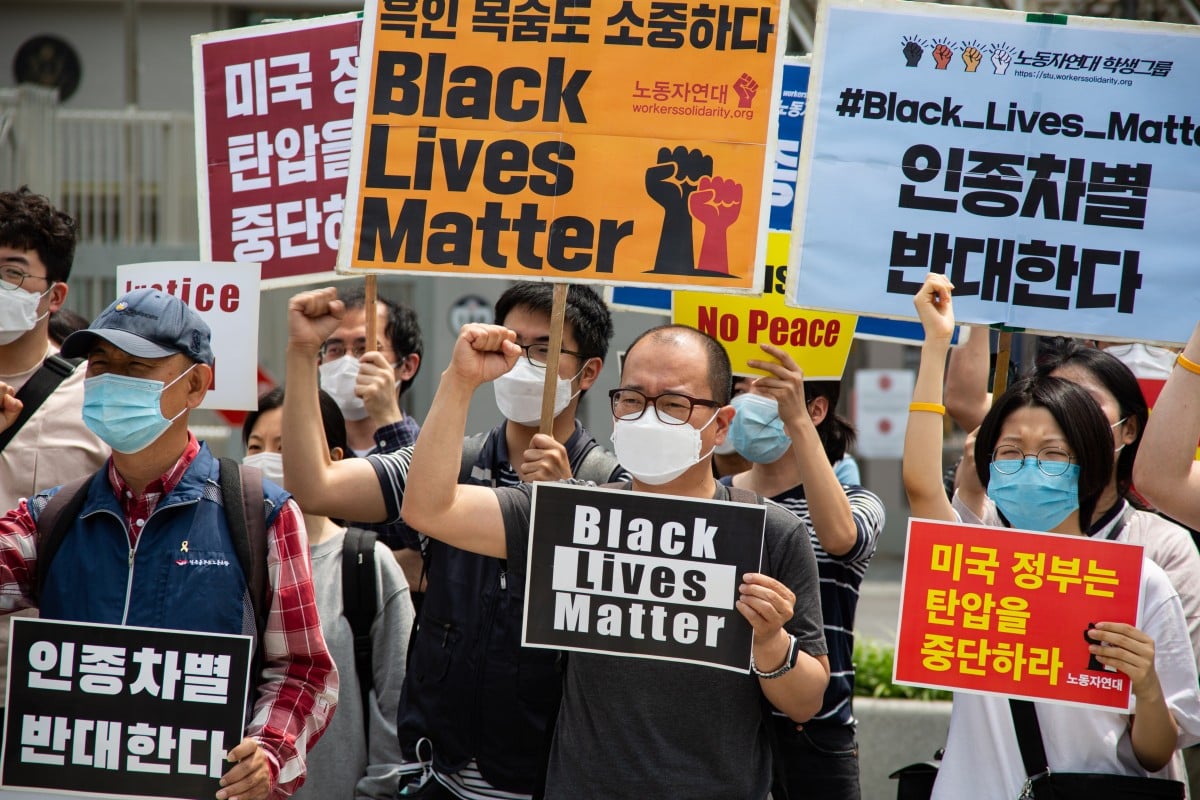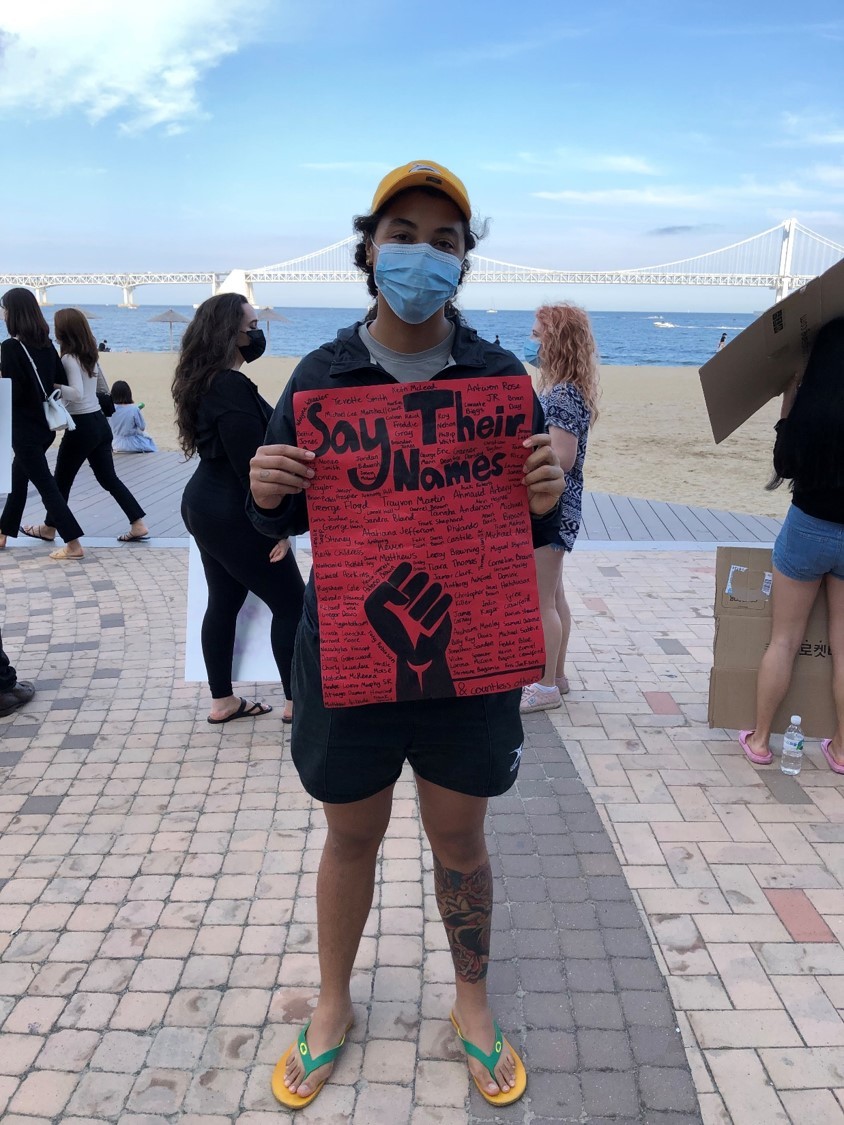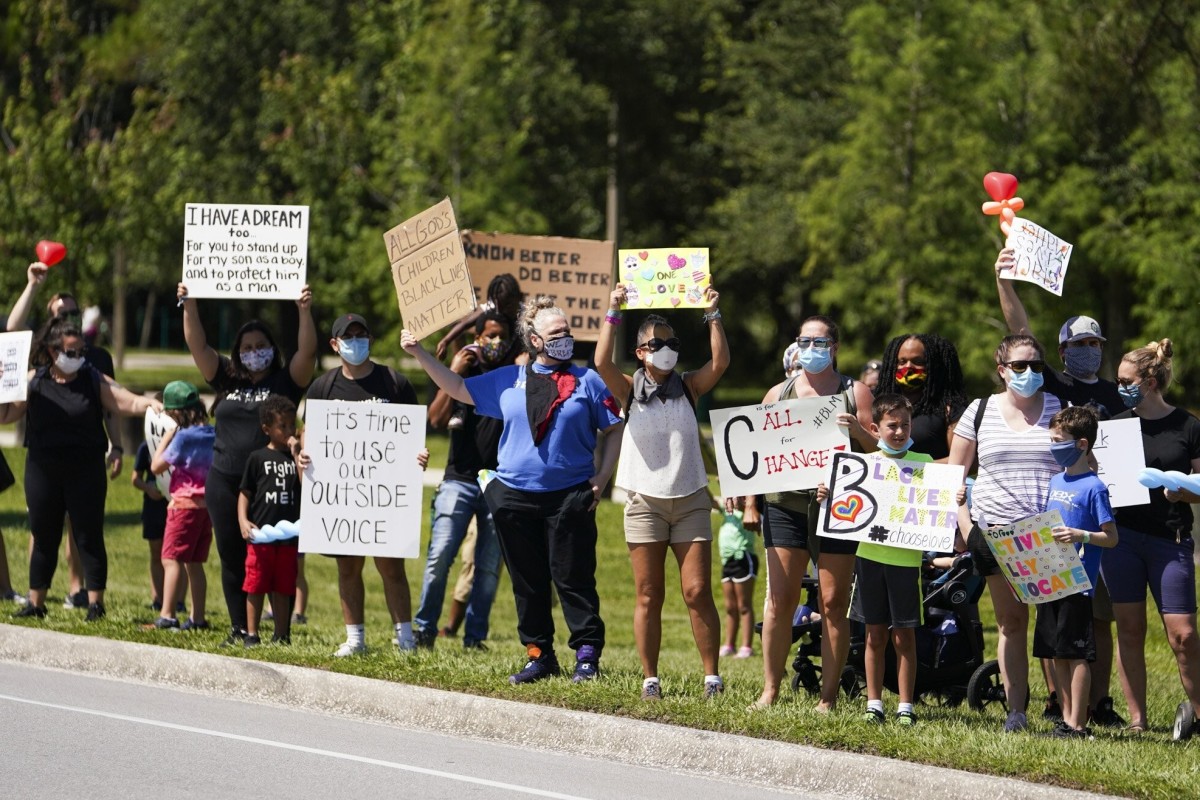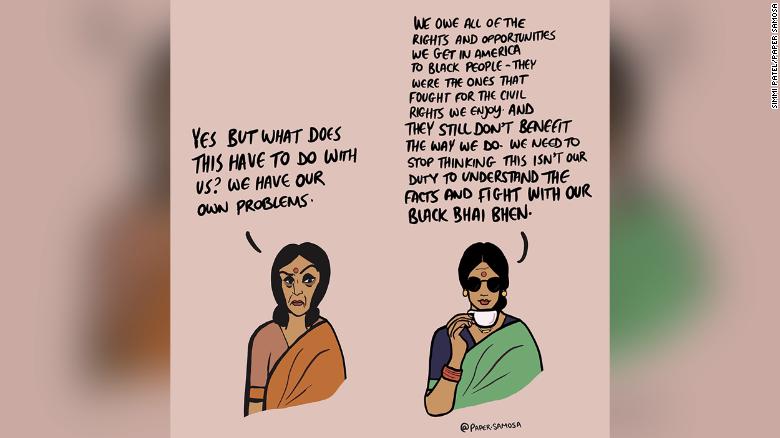Here are several media reports on the public response to the Black Lives Matter movement in East Asia and among Asian-American communities:
Compiled by Student Assistants Katherine Kane and Anna H. Bartsch and Program Coordinator Ansel Lurio
South Korea
The Black Lives Matter movement has come to South Korea, not only in solidarity to oppose racial injustice in America but also as a reminder of racial discrimination in South Korea. There is a wide acceptance that racism in South Korea exists—some bars and taxi services will not serve certain people solely based on ethnicity. Approximately nine out of ten people know of the racial issues in South Korea. In 2006 an anti-discrimination law failed to pass in the national assembly. Similar actions have stalled even with the 2015 UN human legal committee recommending such legislation. Presently, the National Human Rights Commission of Korea is drafting a law to propose to the national assembly to penalize discrimination on the grounds of gender, race, or employment status. According to Shim Ji-hoon, a social worker who has organized marches in South Korea, those who face racial discrimination include migrant workers, international students, and multicultural families. The pandemic has especially hit hard migrant workers in South Korea, immigrants who pay taxes yet are excluded from receiving emergency supplies such as masks and disaster relief funds. The hope for the protests is not only to be in solidarity with America but also to make sure what happened to George Floyd will never happen in South Korea. Even an online cartoon artist, Yerong, has worked on a piece to explain to Korean citizens what happened to Floyd. The cartoon has been widely spread through social media and has been translated into eight different languages.

South Korean activists demonstrate near the US embassy in Seoul. Photo: EPA
https://www.pri.org/stories/2020-06-08/america-s-blm-protests-find-solidarity-south-korea
This article addresses similar points as the prior one but also discusses how many South Koreans have watched “lopsided” news reports on the riots. They have seen how Korean-American businesses have been destroyed without having the proper information on why the riots took place and who were partaking in them. This was common even more during the 1992 Los Angeles riots. However, some journalists are beginning to explore the context of the riots. They are also doing a good job in explaining the history of American racism to Korean viewers. Korean reporters are covering more news from around the world and by doing so are getting a better understanding of the issues of Black culture and social injustice. Many young students are working to provide information on racism and fight prejudice in South Korea as well. K-pop band BTS has donated $1Million to the Black Lives Matter movement and has asked their fans (army) to match this donation as a group. Many Korean artists have a deep respect of the impact and importance of Black culture (personally and professionally). K-pop fans across the globe have also been hijacking hashtags that go against Black Lives Matter and spamming them with clips of their favorite idols. The experience of pop-star Rihanna is that as a Black woman she gets as much similar negative treatment in Seoul as she does in California but due to both countries having very different histories she gives Koreans more leeway than she would to those back in the US.

A demonstration in Seoul called out racial injustice in the US and xenophobia in South Korea, June 6, 2020. Credit: Jason Strother/The World
http://www.koreaherald.com/view.php?ud=20200622000648
In Busan, South Korea, at the Gwangalli beach, a large group of individuals came together to protest the police brutality against Black Americans in the US. This protest was met with many supporters but some fear that this sense of solidarity could have correlations with the racism fueled by COVID-19. Many Koreans in other countries are faced with some Westerners telling them to go back to china or take the disease with them back to china simply because they are Asian. One individual stated, “my kids are not white, I hope they can grow up in a better world then I grew up in.”

Rebecca Tillman poses for a photo at the rally at Gwangalli Beach, Busan.
Japan
On June 7th, a giant protest for Black Lives Matter was held across Osaka and the Kansai region. Some protestors were seniors, but the majority were younger than 40 years old. The media has tried to label this movement solely an American issue yet most people in Japan understand that this issue is one that concern morals on a universal level. This leads to the treatment of minorities in Japan which is a concern for many in Japan. The hope is that this movement (along with others) will awaken a generation who will fight for human rights to redo the old thinking of the 1960s and 1970s.

Participants in a Back Lives Matter protest call for eradicating racial discrimination in the city of Osaka on June 7. | KYODO
Racial Violence against Asian-Americans
With the death of George Floyd and the spread of protests for the Black Lives Matter movement, the reactions from the Asian-American community have been mixed. It does not help that one of the police officers that stood by and watched George Floyd die happened to be Asian American. The coronavirus pandemic and strained US-China relations have created an increase in violent and racist attacks against Asian Americans, who usually benefit from the model minority myth. While some Asian Americans think that it is not their job to interfere in the Black Lives Matter movement, many others believe that Asian Americans need to stand side by side with black people in the movement for equality and justice. Many Asian-American groups, such as the Asian-American Business Development Centre, have teamed up with groups such as the Hispanic Federation and 100 Black Men of America to raise money for personal protective equipment for the people of color (POC) community, which has been disproportionately affected by the pandemic. However, many Asian Americans, who struggled when immigrating to America, have anti-blackness culturally ingrained into their upbringing, making it hard for them to choose a side in Black Lives Matter. This is highlighted by the concept that Asian Americans are neither white nor black, making them feel like outsiders in what is considered a “white vs. black” divide.

Children and families during a rally and short march in support of Black Lives Matter at Al Lopez Park, Tampa, Florida on Friday. Photo: Tampa Bay Times via ZUMA Wire/dpa
https://www.washingtonpost.com/business/2020/05/19/asian-american-discrimination/?outputType=amp
All around the United States, Asian-American healthcare workers are facing an increase in racist attacks due to the coronavirus pandemic and stigma around Chinese and Asian Americans. One example of this is what happened to Lucy Li, an anesthesiology resident at Massachusetts General Hospital. After work, a man followed her from the hospital to the subway, shouting racist slurs at her the whole way. Li felt lucky that she was not physically attacked, but then was saddened that she felt that way. Li then felt angry because she had spent her days risking her life to save others during the pandemic, only to be racially attacked due to what was once called the “Chinese” virus. Eighteen percent of the country’s physicians and ten percent of nurse practitioners are Asian Americans, who are being faced with painful problems in the midst of the pandemic. Not only is there an increase in racial and bigoted attacks, but some Covid-19 patients are even refusing to be treated by Asian-American doctors. There is even an FBI warning of potential increases in hate crimes against Asian Americans once stay-at-home orders are lifted. For now, there have been over 1800 reports of racism against Asian Americans since March 19. There has also been a lot of “China-bashing” in the US government as well, which has contributed to the racism against Asian Americans. There are many stories out there like Li’s, of Asian-American healthcare workers being harassed because of their race, despite the good they are doing during the pandemic.

Audrey Li at Harvard Medical School in Boston on May 14. One hospital patient told Li to “go back to your country.” (Olivia Falcigno/For The Washington Post)
https://amp.cnn.com/cnn/2020/06/13/us/asian-americans-blm-conversations-trnd/index.html
The younger generation of Asian Americans often faces the problem of racism and anti-blackness in their communities, especially from their parents and the older generation. For instance, many Asian Americans, such as Koreans, would prefer that their children do not date or marry African Americans. However, with the death of George Floyd and the Black Lives Matter movement, many Asian Americans are having the difficult conversation with their parents of how Asians need to eliminate racism towards POC and how they need to support the Black Lives Matter movement. Joyce Kang decided to help by joining the “Letters for Black Lives” project. The letters explain to older Asian Americans how racial issues in the black community also affect them and how they need to support POC as well. The letter has been translated into 26 Asian languages and incorporates racial issues specific to each community it was written for. Kavya Balaji and her friends Shilpa Bhat, Shefali Mangtani and Audreela Deb started a newsletter for older Southeast Asians to explain what is happening with the Black Lives Matter movement. Simmi Patel makes memes and informative posts on social media to inform and educate many older Asian Americans who never learned about black history or oppression in their childhoods. There is even a California based advocacy group called South Asians for Black Lives that helps tackle the racism in Asian communities.

https://www.hrw.org/news/2020/05/12/covid-19-fueling-anti-asian-racism-and-xenophobia-worldwide#
Due to the Coronavirus xenophobia and racism towards Asians has drastically increased. Here are some statistics on anti-Asian incidents across the US:
- One-third of Americans have witnessed someone blaming Asian people for the pandemic
- 1,710 incidents reported to STOP AAPI HATE – 15% of those cases involved physical assault or being coughed on or spat at
- More than 100 individual incidents reported in the media
- 133 incidents of anti-Asian discrimination recorded by the New York City Commission on Human Rights – compared to 11 in the same period last year. The commission has intervened in 91 cases.
- 14 Asian-bias hate crimes investigated by police in New York
- More than 100 alleged hate incidents reported to civic groups and police departments in Los Angeles
- Six reports of bias incidents reported to police in Seattle
- There has been a surge in anti-Asian hate in extremist web communities
-
In this screenshot, a man helps a shop owner pick up a display stand after a group of teenagers vandalize the store in Chinatown San Francisco on March 16, 2020. © 2020 CrimesAgainstAsians/Facebook